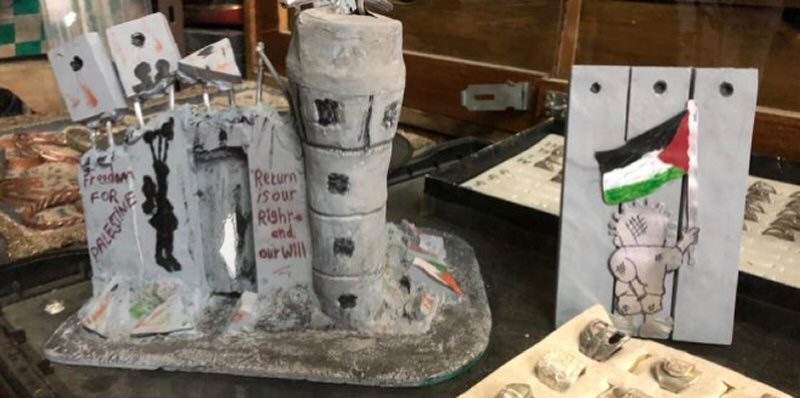Handicraft prepared by Akram Warah and his family from the wreckage of war artifacts. Credit: Alethea Kanas
For at least a decade, Palestinian refugees lived in makeshift tents precariously in Aida. Little by little, with each day less hope of returning home together with the desire to have a “normal” life, they began to build their houses right there and settled in the place where they remain until the present day.
Akram Warah was one of them. He was born and raised in the field, along with 13 more brothers. Now 51 years old, he still lives in Aida – now with his six children and the wife he met 24 years ago during a work season in Iraq.
“It may sound like a joke, but I built it all, the two floors alone, in just a whole year of hard work. Every brick, every window, every electric part. And that’s how I managed to give my family a little more comfort, “he said proudly and with tears in his eyes. Construction was completed two years ago. For a long time Akram lived unexpectedly in the house of one of the brothers, who also lives in Aida. The camp that has once been the scene of dangerous clashes, deaths, protests with sad endings and invasions of Israeli soldiers at all times, has enjoyed a little quiet for almost a year.

“I’m not going to say we’re 100% safe, but we live more calmly, we do not spend more sleepless nights feeling that some Israeli soldier is going to invade our house at any time. Some time ago, they were knocking at my door to make searches, they took us out of the house. Although I feel sad about everything we have already experienced, besides seeing my children and my wife go through this embarrassing situation, I have always preached peace. We offer no danger, so we have no problems with anyone and we do not create any situation that makes us targets. In this way, we try to live the best possible way, “he concluded.
Currently, the camp suffers from overcrowding, but is still connected to the municipal electricity and water networks of Bethlehem, and everyone can get access. The population survives on the basics – almost half of the population does not work and the sewage networks are quite poor. In contrast, the UN manages two schools within the Aida camp itself and virtually all children have guaranteed education. The Aida refugee camp receives a large number of tourists, many curious to know the life history of these people and others who decide to volunteer in some organizations around the camp that provide assistance to Palestinian residents. And it is through tourism that Akram manages to support the family. In addition to often receiving exchange students at his home, who spend a season sharing cultures and still developing projects for field and well-being improvements of these families, he maintains a store a few meters from home for at least ten years.
Akram Warah, next to one of the daughters. He was born, raised and lives today in the Aida camp. Credit: Alethea Kanas
The small trade differential, compared to the many others in Bethlehem, is that all the products sold are recycled from leftover materials and other artifacts used during those years of conflict between Israel and the Palestinian territory. “I was thinking how to get off a war so horrible as this. Until, all of a sudden, the idea came into my head.
With the help of one of Akram’s children, he makes each piece, such as costume jewelry and Palestinian articles that resemble the struggle for the much-desired freedom. “Now the movement is better. There was a time when the camp stopped receiving tourists because it was a dangerous place and that has greatly damaged our work, “said the Palestinian. Despite the effort the monthly income is very unstable, it varies to the equivalent of R $ 200 to R $ 1,000, depending on the amount of foreigners they receive. Many of the refugees living in the camp, and in Palestine as a whole, still await a solution to this problem and the chance to return to the real home. When asked about it, Akram did not think twice. “I think returning home, to the place where my parents were born, is the dream of our whole family. But before that, an agreement must happen. I want to move from here with the certainty that we will live in peace. All my children are studying and my dream is that they have a bright future, here or anywhere in the world that they are, but always safe, “he concluded.

Store maintained by Warah in the refugee camp of Aida, which sells recycled artifacts of war artifacts. Credit: Alethea Kanas
Human Interest 02/05/19 Palestinian Documentary Wins 33rd Goya Award (VIDEO)


